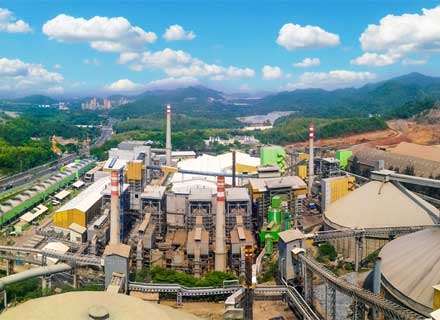Thailand-based TPI Polene Power Plc has the goal to be a high-quality and high-standard industry leader in the field of power generation through renewable energy sources. While focusing on the continuous development of technology and staff to create the highest benefits for the stakeholders and the overall industry, the Thai venture intends to operate its business by adhering to the principles of ethics and good corporate governance.
TPI Polene, which was honoured for being the ‘Best ESG Energy Efficiency Initiative Company’ during the International Finance Awards 2023, supports the municipal waste disposal initiatives in Thailand by converting waste to fuel and energy, apart from generating electric power from renewable energy by using fuel from refuse and waste heat.
The venture, while developing production technologies suitable for waste conditions in Thailand, is also manufacturing industrial refuse-derived fuel.
By maintaining and following the standards of environmental impact management, TPI Polene is also building responsibilities for its stakeholders, apart from committing to social development together with corporate sustainability.
Persistent drive toward higher efficiency
“Leveraging on the knowhow accumulated over years of R&D activities by our over 500 or so scientists and engineers in both processes and products TPI Polene Power Plc (TPIPP) persistently aimed to squeeze more efficiency gains to drive operating rates and profitability of its power plants while advancing the goal toward lower carbon footprint, extract more economic value from household garbage and waste and help Thailand address the problem of ever-increasing household garbage and shrinking area available for dedicated landfills,” the venture told the International Finance.
By 31st December 2021, the company had eight commercially operating power plants with a total of 440 MW of installed power generation capacity, divided into Waste-Fired Power Plants and Waste Heat Recovery Power Plants.
Harnessing power from waste heat
TPI Polene has emerged as Thailand’s second-largest cement producer with an installed capacity of 13.5 million tons combined from its four plants.
“In the process of turning limestone into clinker a raw meal is produced in the rotary kiln that is to be solidified quickly via air quenching chambers (AQCs) to cool the clinker. The process results in the emission of hot exhaust gas from the AQCs. Previously this hot exhaust gas was released into the atmosphere. Now facilities have been installed to recover the hot exhaust gas feed it to the boilers and produce steam using condensed water that is then fed into the steam turbine that drives power generation. From the four plants, TPIPP can produce up to 40MW of power from the recycled waste heat,” the venture informed International Finance.
Some of the gains from this method are the reduction of heat released to the environment, reduction of power consumption purchased from the national grid, and value creation for industrial waste.
“Our processing techniques, always adapting in order to extract the highest calorific value have allowed us to bring down the processing cost of the waste,” TPI Polene continued further.
Fossil free by 2026
“To advance our ESG agenda and make a more definitive contribution towards BCG economy, we are embarking on a five-year modification project to convert our coal-fired power plant capacity to WTE-MSW. Upon completion our MSW requirement will rise to 17,000 tons per day which could translate into 12.0 million tons of CO2 equivalent based on specific ratios. Along with other ongoing accreditation projects, we will continue to add carbon merits boosting our current certified carbon of 1.2 million tons and 1.4 million I-REC credits,” TPI Polene remarked.
Also, TPI Polene also has the commitment to embrace the policy called ‘Circular Economy’ at all stages of its business operations.
“Waste from one process is a raw material for another to maximise the benefits of resource utilisation. In a bio-based economy, material cycles are efficient and sustainable in the supply chain in the business, social and community sectors,” it stated.
“In addition, TPI Polene Group aims to improve the group’s production efficiency and products under the concept of renewable biological resources and the conversion of these resources and waste streams into value-added products to support the country’s agricultural sector in the country,” the business stated further.
“The joining of the three initiatives, the Circular economy, the Green economy and the Bio-economy represents the implementation of the economy towards sustainable development, and as mutually supportive concepts, which is called Bio-Circular-Green Economy (BCG), a business model innovation to drive TPI Polene Power Group to grow with globally competitive advantages and to diversify income to communities by protecting the surrounding environment to further enhance the sustainable growth,” TPI said.
The key objective here is to manufacture green products, thus covering areas including sales, logistic systems, and after-sales services.
“The positive impact we generate cuts across various stakeholders from creating value for our shareholders, helping Thailand address the issue of ever-growing pile of garbage, creating opportunities for better land use and economic value of cleared landfills and promoting green economy,” TPI Polene concluded.

